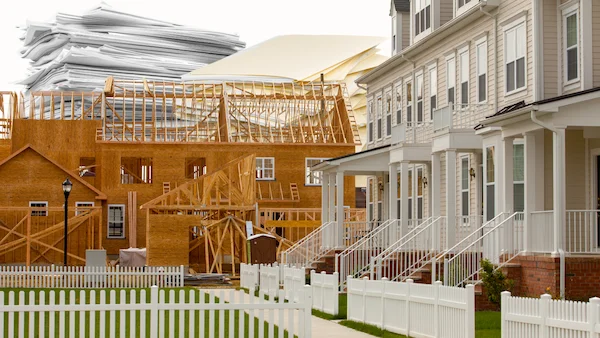Everywhere you turn today, someone is calling for more housing. On its face, that seems like a reasonable response to the affordability crisis gripping cities of every size. We’re told that if we just build more, prices will drop. If we make financing easier, we’ll unlock access. If we subsidize more units, we’ll solve scarcity.
And yet, with each passing year, we build more homes and housing gets more expensive.
This contradiction lies at the heart of what "Escaping the Housing Trap," the Strong Towns book, sets out to explain: America’s housing crisis isn’t a numbers problem. It’s a systems problem.
The Expensive Growth Experiment
Over the past several decades, North America embarked on a vast suburban experiment. We created a development model that prioritizes large-scale, expansive growth spread across vast areas. And while we succeeded in producing a lot of housing at scale, what we really built was a system dependent on further expensive growth.
Every new subdivision, apartment complex, and mega-development comes with enormous infrastructure and financing costs. We have locked ourselves into a model where building is more expensive and more complicated.
So, even when we do build more houses, they often come at a cost far too high for the average resident because they must carry the weight of a bloated delivery system. We didn’t just build homes; we built a housing trap.
Why Money Alone Won’t Save Us
When housing is expensive, governments often respond by throwing money at the problem. Lower interest rates. Bigger grants. More tax credits. More money for first-time homebuyer programs and down-payment assistance. These tools are often well-intentioned, but they don’t address the root problem.
Instead of making housing more affordable, we made it easier for more people to borrow more money to pay more for housing. In practice, these subsidies just make it easier for prices to rise. When you increase access to debt or inject cash into a broken delivery system, you’re not solving the problem; you’re fueling the fire.
Rather than asking how much money we can throw at housing, we should be asking why it is so hard to build a modest home in the first place.
Simplify the System, Strengthen the Strategy
The real crisis is structural. We’ve made it hard and sometimes nearly impossible for ordinary people to build small, practical housing.
That’s why the Strong Towns approach focuses on making cities Housing Ready. This approach doesn’t start with supply goals or spending plans; it starts with reforming the system.
There are three areas where cities have the power to heal their housing markets from the bottom up:
- Code Reform: Simplify codes so that small-scale projects don’t require a team of consultants and a mountain of capital. The Housing-Ready Cities toolkit outlines six code reforms that cities all across North America are implementing. These code reforms are not about deregulating everything. They're about de-complicating housing so regular people can participate in creating it.
- Grow an Ecosystem of Incremental Developers: Small-scale or incremental developers are regular people already in your community who want to make an investment into a starter home, convert an existing home into a duplex or triplex, or build a backyard cottage. Not all developers are alike, and these hyper-local developers should not be confused with national developers who have an army of staff to navigate your community. Incremental developers need the support of the community and maybe a little extra time from city hall to navigate an incremental project.
- Localize Finance. Cities are, by definition, public corporations. They have balance sheets, the city council acts as a board of directors, and residents are shareholders. Cities make both explicit and implicit financial decisions that impact the development of housing. Cities can be more explicit in these decisions to attract money that’s currently sitting on the sidelines. Cities also have the ability to fill financial gaps through smarter public investments that create community wealth.
We Can Fix Our Housing Market If We Focus on the Systems
When we recognize the housing crisis as a systems and strategy problem, we realize that there is no shortage of things cities can do right now to address it. Every city department, from planning to finance and even public works, has a role to play in improving the system. These departments are filled with staff who are most familiar with the current system and can help address places where it is broken.
This reform can occur from the bottom up with the resources our cities have today. When that happens, we'll do more than address housing affordability. We’ll build places that are financially productive, community-oriented, and resilient. We’ll build stronger towns, and that’s a future worth investing in.




.webp)
.webp)